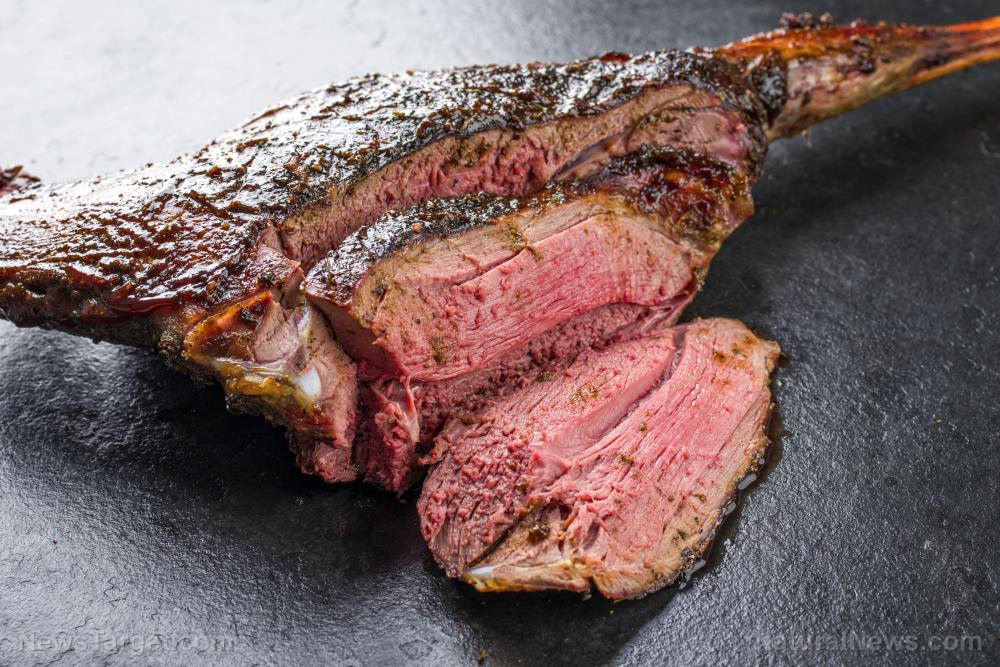
Advertisement
Have a yen for steak? You might want to check out this newest meat. It’s tender, it’s got a rich texture and it might just make your mouth explode. The catch? It’s grown from the lab.
Harvard University scientists developed lab-grown meat made of thin strands of pig-derived gelatin that mimic muscle fibers. The gelatin resembles the “extracellular matrix” — the “glue” that holds natural meat together — and serves as a base on which rabbit and cow cells would grow. By using gelatin to make the fibers, the researchers created a tender meat analog that looks vaguely like pulled pork.
The researchers drew inspiration from cotton candy machines, where sugar is heated in a container and spun at high speeds, flinging and crystallizing into strands to form into a pinkish cloud. The same principle works here, except gelatin is spun much faster, at 30,000 rotations per minute, in an ethanol bath to keep the fibers from falling apart as they fling out of the machine.
The researchers then seeded the fibers with skeletal muscle cells of rabbits and cows. The cells proliferated and formed protein junctions. In effect, the protein of the lab-grown meat looked similar to natural rabbit muscle but its tissue distribution more closely resembled that of processed meats like ground beef.
The researchers then examined the texture of the lab-grown meat using a metal hammer. Its chewability, or toughness, is close to that of other kinds of real meat.
The lab-grown meat is considered a huge leap, but it would take some time before it hits the shelves. For starters, the researchers didn’t taste and cook the meat because, for one, the lab isn’t food-safe. The meat is also quite expensive because the process requires costly animal-derived serums to nourish the growing cells.
Is lab-grown meat the future of our protein sources?
Lab-grown meat is considered an eco-friendly alternative to real meat because it eliminates the need for livestock. It can reduce energy use by up to 45 percent, water use by up to 96 percent and land use by 99 percent. It also produces fewer amounts of greenhouse gases. On top of that, no animals will be harmed or treated unethically.
Because of these advantages, many companies have started investing in lab-grown meat. American company Eat Just recently unveiled its lab-grown chicken meat and made a landmark achievement last year when it passed a food safety review by the Singapore Food Agency. The chicken meat, called “chicken bites,” made its historic debut at a Singaporean restaurant not long after it was approved for human consumption.
Another company, Israel-based Future Meat Technologies, announced plans in 2019 to sell hybrid products that use lab-grown fat and plant protein by this year. Founded just in 2018, the firm recently built a meat manufacturing facility that began production last year. It made significant advances this year when it managed to reduce production costs for a lab-grown chicken breast to below $10. That’s several times cheaper than the first lab-grown hamburger, which cost more than $300,000 dollars to make and took two years to develop.
Disadvantages of lab-grown meat
Despite those advances, the cultured meat industry still has many issues to resolve. Here are some of the disadvantages of lab-grown meat:
- Not as eco-friendly as initially thought. Recent research suggests that the environmental impact of lab-grown meat could be higher than that of livestock. That’s because the infrastructures needed to produce cultured meat require high amounts of energy. Additionally, reducing animal farming can also bad for the environment because livestock fulfill functions other than just providing meat.
- May not eliminate animal cruelty. Most types of lab-grown meat have used calf fetus blood in its growing medium. When a pregnant cow dies, the fetus is removed from its mother and bled to death. The blood is then refined and turned into a serum. A few companies are already looking for other ways to grow animal cells but many still employ that cruel practice.
- May be bad for health. It’s still too early to tell, but some experts have warned about the toxicity of plastic products used to package meat. Plastics contain hormone-disrupting compounds that can be transferred to food. This has been documented in cell cultures grown in plastic containers.
- Reliant on antibiotics. Researchers are heavily dependent on antibiotics to ward off bacterial contamination, as cultured cells do not have an immune system to fight off germs.
- Still too expensive. Future Meat’s achievement aside, producing lab-grown meat is still too costly to be scaled up.
- Can lead to biotech monopolies. There are already patents in place for lab-grown meat, raising concerns of a power grab from a few companies that seek to control the world’s food supply.
Lab-grown meat is slowly creeping into stores and restaurants, thanks to food companies that paved the path for it. But many issues still need to be addressed if we’re going to be serious about eating lab-grown meat. In the meantime, it’s best to stick to the real thing. Better, go green and add more fresh fruits and veggies to your diet.
Sources include:
Advertisements







